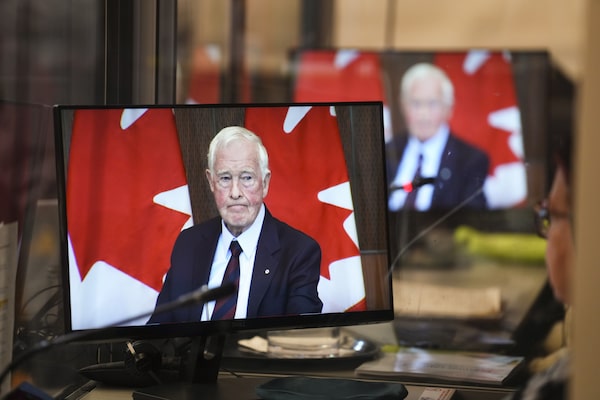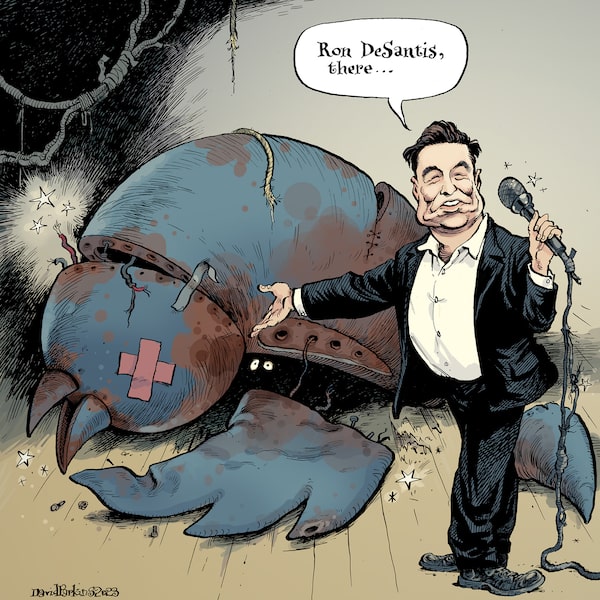Good morning,
Leaders of Canadian activist and religious groups targeted by Beijing are calling for a public inquiry into foreign interference, saying it isn’t enough for former governor-general David Johnston to hold hearings to listen to their concerns about China’s efforts to silence their criticism.
Groups representing human rights activists, Muslim Uyghurs, Hong Kong pro-democracy dissidents, Falun Gong practitioners and supporters of independence for Tibet told The Globe and Mail they’ve been sounding the alarm for years about Beijing’s harassment and intimidation tactics. They have spoken to parliamentary committees about the issue and it’s now time for a full inquiry, headed by a judge with subpoena powers.
MPs on the Commons procedure and House affairs committee voted Thursday to call Johnston to testify for three hours on June 6. Johnston, the special rapporteur, said in his report that a formal public inquiry into foreign meddling in the 2019 and 2021 elections would not work because much of the classified intelligence could not be shared with the public. Prime Minister Justin Trudeau said he is abiding by that recommendation. The three main opposition parties in the minority Parliament have called for a full public inquiry.

David Johnston, Independent Special Rapporteur on Foreign Interference, is pictured on the screens of translators as he presents his first report in Ottawa on May 23, 2023.Sean Kilpatrick/The Canadian Press
This is the daily Morning Update newsletter. If you’re reading this on the web, or it was forwarded to you from someone else, you can sign up for Morning Update and more than 20 other Globe newsletters on our newsletter sign-up page.
Privacy commissioner expands investigation into ChatGPT
Canada’s federal privacy regulator is expanding its investigation into OpenAI, the creator of ChatGPT, to address concerns about the potentially harmful consequences of artificial intelligence.
On Thursday, the Office of the Privacy Commissioner of Canada said privacy commissioners in Quebec, British Columbia and Alberta will be part of the effort, and that the investigation is being broadened beyond the initial complaint.
Read more:
The logo of OpenAI is displayed near a response by its AI chatbot ChatGPT on its website, in this illustration picture taken Feb. 9, 2023.FLORENCE LO/Reuters
British PM Sunak under pressure as migration to U.K. reaches new record
Brexit was supposed to allow Britain to “take back control” of the country’s borders and have more power over immigration. But figures released on Thursday showed that net migration reached a record high last year – 606,000, which is more than twice as high as when Britain was part of the European Union – despite promises by consecutive Conservative governments to reduce immigration to pre-Brexit levels.
The report is a political headache for Prime Minister Rishi Sunak and his Conservative colleagues who supported Brexit and promised in the 2019 election campaign to keep net migration below 245,000, close to where it was when Britain voted to leave the EU in 2016.
Mr. Sunak has introduced some measures to cut illegal and legal immigration, but he is under increasing pressure to go much further.

Britain's Prime Minister Rishi Sunak speaks during the London Defence Conference, at King's College, in central London, on May 23, 2023.BEN STANSALL/AFP/Getty Images
Several committees that vet federal judges inactive while case delays grow severe
Six of the 17 committees that screen candidates for the federally appointed bench are not operating, even as judicial vacancies rise to unprecedented heights.
Courts across Canada have been struggling with delay and pandemic-related backlogs in criminal and civil cases, and the number of vacancies – 88, or roughly 9 per cent of the 995 full-time positions – is making delays worse, lawyers in several provinces say.
Now, the Canadian Bar Association has written its fifth letter complaining about the vacancies since Prime Minister Justin Trudeau took office. The letter expressed particular concern about the judicial advisory committees becoming, in its words, “expired” or “defunct.”

The Quebec Court of Appeal is seen in Montreal, March 27, 2019.Ryan Remiorz/The Canadian Press
Got a news tip that you’d like us to look into? E-mail us at tips@globeandmail.com Need to share documents securely? Reach out via SecureDrop
Also on our radar
Freedom Mobile launches $50 plan in first step to boost competition after Rogers deal: Videotron Ltd.’s Freedom Mobile has launched a new $50 wireless plan that allows customers to use their mobile data outside of Freedom’s network, its opening shot in a renewed battle between Canada’s telecoms to capture more mobile phone customers.
Arms, shoulders, wheels and grit: A quadriplegic cyclist’s trek across Canada: After a spinal-cord injury in 2009, Kevin Mills defied the odds to regain some mobility and live an active life. Now, he is testing his strength in a months-long journey from St. John’s to Victoria.
Russia moves ahead with plan to deploy tactical nuclear weapons in Belarus: Russia moved ahead on Thursday with a plan to deploy tactical nuclear weapons in Belarus, whose leader said the warheads were already on the move, in the Kremlin’s first deployment of such bombs outside Russia since the 1991 fall of the Soviet Union. On Friday, Ukraine shot down missiles and drones launched by Russia in overnight attacks on the capital Kyiv, the city of Dnipro and eastern regions. At least one person died after a missile hit a medical clinic.
Bank earnings wrap up as results disappoint and interest rates, recessionary fears bite: Canadian banks were weighed down by the crumbling economic outlook as climbing reserves for potential loan defaults and heated borrowing costs pinched second-quarter growth.
Glencore in talks to merge Canadian grain giant Viterra with U.S. rival Bunge, source says: Global commodities trader Glencore PLC is in talks to merge its agriculture division, which includes Viterra Ltd., the Canadian grain giant it acquired in 2012, with Bunge Ltd. to create a dominant North American company, according to someone familiar with the transaction.
Morning markets
World stocks muted: Global stock markets were muted on Friday, with investors holding their breath as the White House and U.S. lawmakers edged towards a deal on funding government spending to avoid a default. Around 5:30 a.m. ET, Britain’s FTSE 100 was flat. Germany’s DAX fell 0.23 per cent. France’s CAC 40 was off 0.11 per cent. In Asia, Japan’s Nikkei gained 0.37 per cent. Hong Kong’s Hang Seng was closed.
What everyone’s talking about
In an era of extreme heat, cooling should be required in Canadian homes
“Policy-makers should guarantee all Canadians have the right to indoor cooling, which is not synonymous with access to air conditioning, through updating building codes to establish a maximum indoor air temperature, incentivizing the retrofit of buildings and encouraging urban design practices that mitigate the urban heat island effect.” – Scott Stirrett
Why the Conservatives should thank the CBC
“I suspect Conservatives won’t abandon their trashing of the CBC. It’s a convenient scapegoat for a party with a patchwork of regional support, whose more extreme elements tend to be of particular concern to moderate Canadian voters. The anti-CBC chants and rants are an easy deflection from the Conservative Party’s own inability to serve up any actual policy alternatives. After all, gut feelings are so much easier to sell than facts.” – Matthew Hays
Today’s editorial cartoon

Illustration by David Parkins
Living better
To avoid malnutrition in seniors, ‘tiny little interventions’ can go a long way
In Canada, over one-third of adults over the age of 65 are at risk of malnutrition. This, in turn, puts them at higher risk of a long list of other diseases, as well as frailty, falls, and hospitalization. The problem has a disproportionate effect on certain segments: Those living alone or experiencing depression, for example, are at a higher risk. But malnutrition is prevalent in institutional settings too, including hospitals and long-term care centres. And it’s a problem that cuts across income level, class and gender.
Ann Hui reports on institutions that are adapting to do a better job of preventing malnutrition, and the little things that make a big difference in seniors’ lives.
Moment in time: May 26, 1885
Chief Poundmaker surrenders at Fort Battleford

The Surrender of Poundmaker to Major-General Middleton at Battleford, Saskatchewan, on May 26, 1885.Supplied
“My people made war gently,” said Plains Cree Chief Poundmaker as he surrendered on this day in 1885 to Major-General Frederick Middleton, commander of the North-West Field Force, at Fort Battleford. Several weeks earlier, Cree and Nakoda warriors had repulsed a surprise attack on their Cut Knife camp, allowing the defeated Canadian troops to withdraw. Gen. Middleton, though, was in no mood to be generous. Sitting imperiously in a chair, he refused to greet Chief Poundmaker, claiming he did not shake hands with rebels. Gen. Middleton then accused the First Nations of being “on the warpath.” Chief Poundmaker responded that the Cree-Nakoda camp had remained peaceful during the North-West Rebellion and that the First Nations were only defending themselves at Cut Knife. One of the other leaders said his mother wanted to speak on behalf of the women and children. When the Major-General curtly replied that women did not address war councils, Chief Poundmaker wondered aloud why the Queen, the Great Mother, always presided at their supreme councils. This response brought an approving shout from the First Nations and even sent a ripple of laughter through the officers and men when it was translated. The meeting ended with Chief Poundmaker being taken into custody. Bill Waiser.
Read today's horoscopes. Enjoy today's puzzles.
If you’d like to receive this newsletter by e-mail every weekday morning, go here to sign up. If you have any feedback, send us a note.